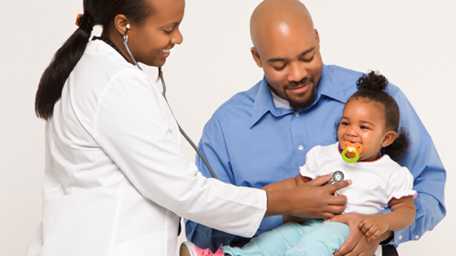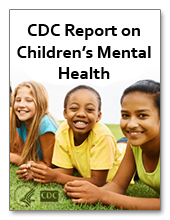Key Findings: Only 1 in 5 parents say their child received a developmental screen
 CDC published a study looking at how often healthcare providers asked parents about their young child’s development. Researchers from CDC and the Health Resources Services Administration (HRSA) found that, in 2007, only 1 in 5 parents were asked screening questions about their child’s development by a healthcare provider during the previous year. This is despite recommendations from the American Academy of Pediatrics (AAP) to screen all children for general development in the first few years of life. This study serves as a baseline assessment of the use of developmental screening before national healthcare changes were implemented.
CDC published a study looking at how often healthcare providers asked parents about their young child’s development. Researchers from CDC and the Health Resources Services Administration (HRSA) found that, in 2007, only 1 in 5 parents were asked screening questions about their child’s development by a healthcare provider during the previous year. This is despite recommendations from the American Academy of Pediatrics (AAP) to screen all children for general development in the first few years of life. This study serves as a baseline assessment of the use of developmental screening before national healthcare changes were implemented.
You can read the full article here https://www.cdc.gov/mmwr/.
Main Findings
- The AAP recommends that all children be screened for general development using a validated questionnaire at ages 9, 18, and 24 or 30 months. However, the national survey data in this study showed only 21% of parents said their child was actually screened by a healthcare provider. Screening was equally underused for children in all race, ethnic, and income groups.
- About half (52%) of healthcare providers informally asked parents if they had concerns about their child’s learning, development, or behavior. However, the report of a concern by a parent did not increase providers’ use of developmental screening.
About this Study
- This study analyzed data from the 2007 National Survey of Children’s Health (NSCH) to provide a snapshot of developmental screening prior to national healthcare changes. NSCH uses a nationally representative sample of parents of children from birth to 17 years of age. Parents are asked questions about their child’s health status.
- Within the 2007 National Survey of Children’s Health, parents or legal guardians of more than 13,000 children from 10-47 months of age were interviewed. They were asked if a doctor or healthcare provider
- Asked them about concerns they may have about their child’s learning, development, or behavior, or
- Asked them to fill out a questionnaire about specific concerns or observations about their child’s developmental, communication, or social behaviors during the past year.
If they did have concerns, parents were asked follow-up questions about specific areas of development, such as talking and interacting.
- While the data reported in this study are not the most recent NSCH data on developmental monitoring and screening, this report provides important baseline information on parent-reported experiences during healthcare visits, prior to implementation of the national healthcare changes that are part of the Affordable Care Act (ACA).
- This report also stresses how critical it is for parents to discuss their child’s development with their healthcare provider at every well-child visit or whenever there is a concern.
How children play, learn, speak, act, and move offers important clues about their development. Developmental milestones are things most children can do by a certain age, and physicians look at these milestones to check a child’s development.
Since the implementation of the Affordable Care Act, developmental and autism screening are now covered preventive services for children. As part of the Bright Futures Guidelines for children’s healthcare, the AAP recommends that parents and healthcare providers should talk about the child’s development at every well-child visit or whenever there is a concern. Also, formal screening using questionnaires should be used at the 9, 18, and either 24 or 30 month well-child visit for all children.
CDC’s Activities
CDC and its federal partners are committed to promoting awareness and providing tools to improve early identification and linkage to services and supports for young children with developmental delays or concerns.
- CDC’s “Learn the Signs. Act Early.” program aims to improve early identification of children with autism and other developmental disabilities so children and families can get the services and support they need as early as possible.
- For resources and information on developmental screening, please visit www.hhs.gov/watchmethrive.
Paper Reference
Rice C, Van Naarden Braun K, Kogan MD, Smith C, Kavanagh L, Strickland B, and Blumberg SJ. Screening for Developmental Delays Among Young Children – National Survey of Children’s Health, United States, 2007. MMWR 2014:63(Suppl-2):27-35.
For More Information
Use of Selected Clinical Preventive Services to Improve Health of Infants, Children, and Adolescents – United States, 1999-2011. www.cdc.gov/mmwr/pdf/other/su6302.pdf
CDC’s “Learn the Signs. Act Early.” program. www.cdc.gov/actearly
Birth to Five: Watch Me Thrive. www.hhs.gov/watchmethrive
American Academy of Pediatrics. http://www2.aap.org/sections/dbpeds/practice-screening.asp
Bright Futures. www.brightfutures.org
Child and Adolescent Health Measurement Initiative. www.childhealthdata.org
Early Periodic Screening, Diagnosis, and Treatment Program (EPSDT) and Title V
http://mchb.hrsa.gov/epsdt/index.html
National Survey of Children’s Health. https://www.cdc.gov/nchs/slaits/nsch.htm
- Page last reviewed: June 11, 2015
- Page last updated: June 11, 2015
- Content source:
- Division of Human Development and Disabilities, National Center on Birth Defects and Developmental Disabilities, Centers for Disease Control and Prevention



 ShareCompartir
ShareCompartir